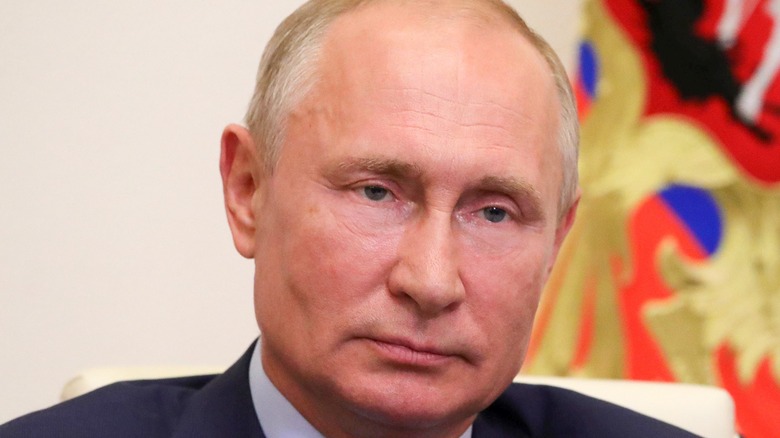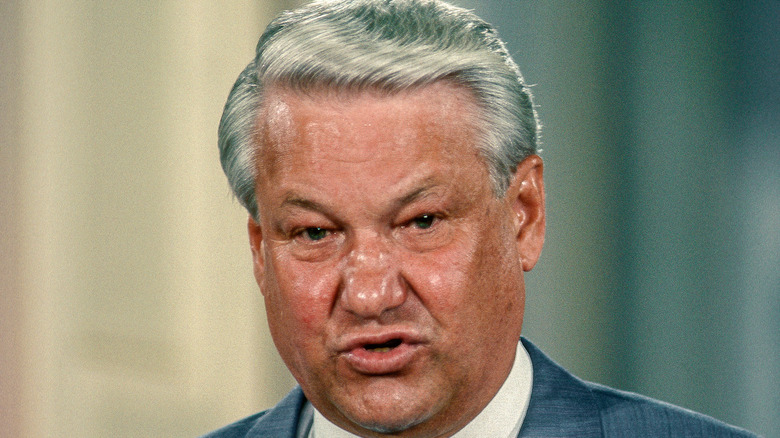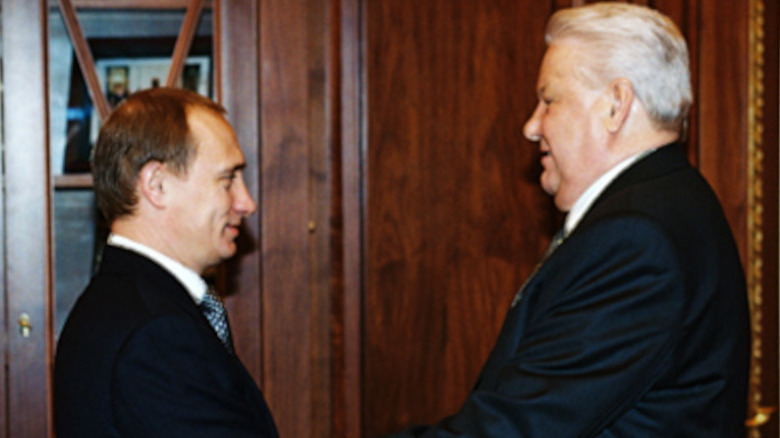How Did Boris Yeltsin Help Vladimir Putin Become President?
A common phrase bandied about by U.S. politicians is "rule of law." Fundamentally, it refers to the idea that everyone in that country is accountable to its laws, and that the laws are equally enforced (per United States Courts). Whereas in reality, that phrase is more of a gray area, at least U.S. courts adjudicate cases involving people from all walks of life. Citizens of many other countries aren't as lucky.
To wit, when Vladimir Putin first came to power in 2000, one of his first public announcements was that of his concept regarding the prophetic "dictatorship of law." Many constituents interpreted that to mean Putin's Russia would be one where laws are executed and obeyed, at the expense of individual privacy protections (via the Center for Strategic and International Studies). Of course, Putin was not the first Russian, the first politician, nor the first post-Soviet Union leader to become ensconced in such a powerful role, where simply threatening a rival wields as much power as making good on that threat.
Vladimir Putin has either been Prime Minister or President of Russia since the summer of 1999, but mere months before his rise to national prominence, he was simply another politician who had gotten his start in the KGB, the Soviet Union's chief security agency (via The Guardian). In fact, it is due in large part to his predecessor, Boris Yeltsin, that Putin was able to take center stage.
Boris Yeltsin's path to Russia's first presidency
According to NPR, Boris Yeltsin started off his career in the expected fashion, working his way up the ranks of the Communist Party in his central-western Russian home of Sverdlovsk. He moved to Moscow in 1985 hoping to further his career, but coincidentally was expelled from the Communist Party by then-leader of the Soviet Union Mikhail Gorbachev (per The Washington Post). From that point onward and through much of the first half of the 1990s, Yeltsin was considered a populist, charismatically fighting Soviet diehards who, after the dissolution of the Soviet Union, still attempted to cling to power.
This was made patently obvious in 1991, when Yeltsin — never one to shy away from photo-ops that showed off his impudence — climbed on top of a tank to denounce the attempted coup of the hardliners dissatisfied by Gorbachev's progressive policies of glasnost and perestroika, as well as his decentralization of Soviet governance over the 15 total republics (via The Guardian). The coup failed, Gorbachev was ousted, and consequently, Yeltsin assumed the role of President after being the first democratically-elected leader in the country's history.
According to the Hoover Institution, although Yeltsin's presidency was, at first, inspired by democratic-leaning principles — e.g. earlier on in his tenure, he chose not to contest the pro-communist courts decision to pardon the coup plotters — his administration was marred by gangsters ruling the streets, cronies being favored, and most notoriously, two wars with the Muslim-majority region of Chechnya. That last bit is where we reconnect Yeltsin with Putin.
Boris Yeltsin paves the way for Vladimir Putin
According to Deutsche Welle, following a stint with the KGB in Moscow, Putin returned to his native St. Petersburg (until 1991, this city was known as Leningrad) to work in the city hall. Through strong connections with St. Petersburg Mayor Anatoly Sobchak, Putin was named Yeltsin's chief-of-staff in 1997, and then the head of the FSB, a domestic intelligence agency, in 1998. Due to his loyalty and powerful friends in the federal government, Putin was hand-picked by Yeltsin to become Russia's Prime Minister in August 1999. This almost immediately proved to be the defining moment in Putin's career, though he doesn't just have Yeltsin to thank.
Per Global Security, Russian troops invaded Chechnya in December 1994, so as to fight back rebels aiming to secede from Russia. After a costly two-year war in which the Chechen capital Grozny was razed, Chechens and Yeltsin signed a ceasefire that would allow for new secessionist talks in 1999. Subsequent to suspicious bombings in Moscow, and Chechen secessionists invading neighboring Dagestan in 1999, Putin, as newly-minted Prime Minster, launched an invasion of Chechnya, which again saw the destruction of Grozny (via Radio Free Europe). Within a few months, Russian troops had taken control of the territory, and Putin's popularity rose as quickly as a 5-star hotel in Dubai.
Simultaneously, Yeltsin, upon realizing that he, his friends, and his family were getting embroiled in corruption scandals, chose December 31st, 1999 as the day to resign (per The Guardian). The future of his briefly democratic Russia was about to be in the hands of a dictatorship of law.


